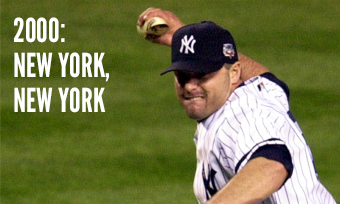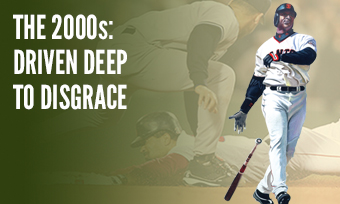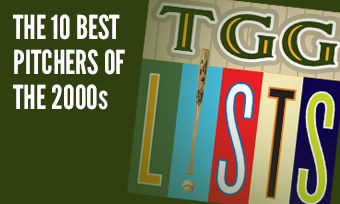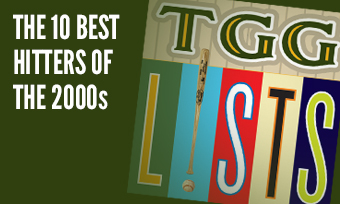The Yearly Reader
Leaders and Honors, 2000
Our list of baseball’s top 10 hitters and pitchers in both the American League and National League for the 2000 baseball season, as well as the awards and honors given to the game’s top achievers of the year.
The National League’s Top 10 Hitters, 2000
Bold type in brick red indicates league leader.
1. Todd Helton, Colorado
Key Numbers: .372 average, 138 runs, 216 hits, 59 doubles, 42 home runs, 147 RBIs, 103 walks, .463 on-base percentage, .698 slugging percentage.
A genuine talent who didn’t need mile-high Coors Field to prove his abilities, Helton stayed above .400 through late July and nearly won the NL’s triple crown.
2. Jeff Bagwell, Houston
Key Numbers: .310 average, 152 runs, 183 hits, 37 doubles, 47 home runs, 132 RBIs, 107 walks, 15 hit-by-pitches.
Bagwell’s crazy total accumulation of runs set an Astros record and was the most by any major leaguer since Lou Gehrig in 1936.
3. Barry Bonds, San Francisco
Key Numbers: .306 average, 129 runs, 28 doubles, 49 home runs, 106 RBIs, 117 walks, 11 stolen bases.
Back to full strength after missing a good chunk of the 1999 season, Bonds reset his career mark on home runs—but that was merely a preview for what was to come for 2001.
4. Sammy Sosa, Chicago
Key Numbers: .320 average, 106 runs, 193 hits, 38 doubles, 50 home runs, 138 RBIs, 91 walks.
It seemed ironic that, sandwiched in between three 60-homer seasons—none of which he would lead the league in—Sosa would take the round-tripper crown in 2000 with “just” 50. All this, while rumors ran rampant late in the year that he would be shipped to the Yankees, Red Sox or Mets.
5. Richard Hidalgo, Houston
Key Numbers: .314 average, 118 runs, 175 hits, 42 doubles, 44 home runs, 123 RBIs, 21 hit-by-pitches, 13 stolen bases.
The young Venezuelan’s out-of-body season—which curiously stood out for scrutiny during the Steroid Era—was not a case of being boosted by the hitter-friendly environment of first-year Enron Field; 28 of his 44 homers were hit on the road.
6. Vladimir Guerrero, Montreal
Key Numbers: .345 average, 101 runs, 197 hits, 28 doubles, 11 triples, 44 home runs, 123 RBIs, 23 intentional walks.
Guerrero set career highs for bat average and home runs with a discipline that belied his reputation as one who, according to his manager of the time (Felipe Alou), “swings from his ass.”
7. Jeff Kent, San Francisco
Key Numbers: .334 average, 114 runs, 196 hits, 41 doubles, 7 triples, 33 home runs, 125 RBIs, 90 walks, 12 stolen bases.
An MVP effort for the abrasive second sacker who finally gave Barry Bonds long-sought, superlative protection in the Giants’ lineup.
8. Brian Giles, Pittsburgh
Key Numbers: .315 average, 111 runs, 176 hits, 37 doubles, 7 triples, 35 home runs, 123 RBIs, 114 walks.
The short (5’11”) but power-packed outfielder became the first Pirate since Ralph Kiner to belt 35-plus homers in back-to-back years. (Giles would stretch that streak to four.)
9. Jim Edmonds, St. Louis
Key Numbers: .295 average, 129 runs, 25 doubles, 42 home runs, 108 RBIs, 103 walks, 10 stolen bases.
In his first year for the Cardinals after seven seasons in Anaheim, Edmonds accomplished what was then unthinkable in St. Louis: Leading a roster that included Mark McGwire in home runs.
10. Gary Sheffield, Los Angeles
Key Numbers: .325 average, 105 runs, 43 home runs, 109 RBIs, 101 walks.
In his second of three full seasons at Dodger Stadium, Sheffield blasted a personal-blast 43 homers and accrued 100-plus runs, RBIs and walks each for the third and final time.
The American League’s Top 10 Hitters, 2000
1. Carlos Delgado, Toronto
Key Numbers: 162 games, .344 average, 115 runs, 196 hits, 57 doubles, 41 home runs, 137 RBIs, 123 walks, 15 hit-by-pitches.
Delgado entered 2000 as a career .267 hitter and left it as a triple crown threat and, briefly before Alex Rodriguez, baseball’s highest salaried player at $17 million per year.
2. Jason Giambi, Oakland
Key Numbers: .333 average, 108 runs, 170 hits, 29 doubles, 43 home runs, 137 RBIs, 137 walks, .476 on-base percentage.
The brash A’s slugger once proclaimed, “Party like a rock star, hammer like a porn star, and hit like an All-Star.” He certainly did the latter in a mind-bending AL MVP effort.
3. Frank Thomas, Chicago
Key Numbers: .328 average, 115 runs, 191 hits, 44 doubles, 43 home runs, 143 RBIs, 112 walks.
After a few years that suggested his career was on the wane, Thomas (15 homers in 1999) returned to vintage form.
4. Alex Rodriguez, Seattle
Key Numbers: .316 average, 134 runs, 175 hits, 34 doubles, 41 home runs, 132 RBIs, 100 walks, 15 stolen bases.
A-Rod bid adieu to the Mariners after a final season in which only 13 of his 41 home runs were hit at the recently-opened, pitcher-friendly Safeco Field.
5. Manny Ramirez, Cleveland
Key Numbers: 118 games, .351 average, 92 runs, 34 doubles, 38 home runs, 122 RBIs, 86 walks, .697 slugging percentage.
For the second straight year, Ramirez knocked in more runs than he played games; Cleveland was 20-22 during his midseason absence from a hamstring injury, and otherwise was 70-50.
6. Edgar Martinez, Seattle
Key Numbers: .324 average, 100 runs, 180 hits, 31 doubles, 37 home runs, 145 RBIs, 96 walks.
Like so many other players on this list, Martinez set career bests in home runs and RBIs, leading the AL for the only time in the latter category.
7. Darin Erstad, Anaheim
Key Numbers: .355 average, 676 at-bats, 121 runs, 240 hits, 39 doubles, 6 triples, 25 home runs, 100 RBIs, 28 stolen bases.
The hits just kept on coming for Erstad, who got to 200 faster than any player in 65 years.
8. Nomar Garciaparra, Boston
Key Numbers: .372 average, 104 runs, 197 hits, 51 doubles, 21 home runs, 96 RBIs, 20 intentional walks.
Garciaparra captured his second straight batting crown and recorded the highest batting average by a right-handed hitter since Joe DiMaggio in 1939; from May 30 through August 4, he hit .422.
9. Johnny Damon, Kansas City
Key Numbers: .327 average, 655 at-bats, 136 runs, 214 hits, 42 doubles, 10 triples, 16 home runs, 88 RBIs, 46 stolen bases.
Bad pitching, not the hitting accumulation of Damon (and Mike Sweeney, below), sank the Royals below .500. Among his 42 doubles were four on July 18, setting a Kansas City record which still stands.
10. Mike Sweeney, Kansas City
Key Numbers: .333 average, 105 runs, 206 hits, 30 doubles, 29 home runs, 144 RBIs, 15 hit-by-pitches.
Brought up as a catcher and moved to first base to preserve his emerging hitting skills, Sweeney delivered with a Royals-record 144 RBIs.
The National League’s Top 10 Pitchers, 2000
1. Randy Johnson, Arizona
Key Numbers: 2.64 ERA, 19 wins, 7 losses, 8 complete games, 3 shutouts, .731 win percentage, 35 starts, 248.2 innings, 347 strikeouts, 26 stolen bases allowed, 17 caught stealing/picked off.
Settled in at Phoenix, Johnson logged the most innings by an NL pitcher in 14 years and made the most of all of them, winning his second of four straight Cy Young Awards.
2. Greg Maddux, Atlanta
Key Numbers: 3.00 ERA, 19 wins, 9 losses, .679 win percentage, 35 starts, 3 shutouts, 249.1 innings, 42 walks, 12 intentional walks, 10 hit-by-pitches, 32 stolen bases allowed.
Despite his ongoing greatness, Maddux missed out on milestones in his last regular season start—failing to win his 20th game (leaving him stuck at 19 for the fifth time in his career) and falling two-thirds of an inning short of Art Nehf’s all-time Braves mark of 41 straight scoreless innings.
3. Kevin Brown, Los Angeles
Key Numbers: 2.58 ERA, 13 wins, 6 losses, .684 win percentage, 33 starts, 230 innings, 47 walks, 20 stolen bases allowed.
The veteran hurler was growing to love those modestly cool, airbrushed sky nights at Chavez Ravine—posting a 7-1 record and 1.79 ERA in 16 home starts.
4. Tom Glavine, Atlanta
Key Numbers: 3.40 ERA, 21 wins, 9 losses, .700 win percentage, 35 starts, 241 innings.
After a rough spring, Glavine bounced back with 14 wins from July 1 on, winning 20-plus games for the fifth (and final) time—leading the league with each occurrence.
5. Mike Hampton, New York
Key Numbers: 3.14 ERA, 15 wins, 10 losses, 33 starts, 217.2 innings, 99 walks, 10 wild pitches, 26 grounded into double plays.
Traded to the Mets from Houston as free agency loomed, Hampton hardly spooked any offseason buyers from giving him a call. Unfortunately, the one he’d accept would be from Colorado (where he’d go 21-23 with a dismal 5.75 ERA from 2001-02).
6. Jeff D’Amico, Milwaukee
Key Numbers: 2.66 ERA, 12 wins, 7 losses, 23 starts, 162.1 innings.
The common pitcher with an oft-repaired shoulder had an uncommonly stingy summer streak after taking a three-week break in June; he was certainly a revelation for a Brewers rotation that otherwise produced an awful 5.53 ERA.
7. Robb Nen, San Francisco
Key Numbers: 1.50 ERA, 4 wins, 3 losses, 41 saves, 5 blown saves, 68 appearances, 66 innings, 9 stolen bases allowed.
The Giants closer continued a trend in which his ERA would bounce back-and-forth from over 3.00 to under 2.00 for seven seasons.
8. Chan Ho Park, Los Angeles
Key Numbers: 3.27 ERA, 18 wins, 10 losses, 34 starts, 226 innings, 124 walks, 13 wild pitches, 12 hit-by-pitches, 23 grounded into double plays.
The first Korean-born major leaguer finally gained marquee value in his seventh season with the Dodgers; he finished the year by starting a streak of 33 straight shutout innings that would last into his second start of 2001.
9. Armando Benitez, New York
Key Numbers: 2.61 ERA, 4 wins, 4 losses, 41 saves, 5 blown saves, 76 appearances, 76 innings, 9 stolen bases allowed.
Taking over the closer’s job from long-time New Yorker John Franco halfway through 1999, the burly Benitez became the first Met to record 40-plus saves.
10. Danny Graves, Cincinnati
Key Numbers: 2.56 ERA, 10 wins, 5 losses, 34 saves, 5 blown saves, 72 appearances, 88 innings.
Born in Saigon during the Vietnam War, Graves earned his stripes as the main closer in a reliable Cincinnati bullpen.
The American League’s Top 10 Pitchers, 2000
1. Pedro Martinez, Boston
Key Numbers: 1.74 ERA, 18 wins, 6 losses, .750 win percentage, 29 starts, 4 shutouts, 217 innings, 199 total bases allowed, 32 walks, 284 strikeouts, 14 hit-by-pitches.
Martinez reset his own mark of a year earlier and produced an ERA two full runs better than the AL runner-up (Roger Clemens, at 3.70).
2. Billy Koch, Toronto
Key Numbers: 2.63 ERA, 9 wins, 3 losses, 33 saves, 5 blown saves, 68 appearances, 78.2 innings.
Setting a then-rookie record for season saves the year before, Koch improved further using a nasty 100-MPH fastball with movement.
3. Bartolo Colon, Cleveland
Key Numbers: 3.88 ERA, 15 wins, 8 losses, 30 starts, 188 innings, 98 walks, 20 grounded into double plays.
Colon broke away from mid-summer malaise by winning his last six decisions after July 26.
4. Mike Mussina, Baltimore
Key Numbers: 3.79 ERA, 11 wins, 15 losses, 34 starts, 237.2 innings, 46 walks.
Oddly, in a year where offense ran amok, Mussina easily drew the worst support (3.3 runs per start) of his career—leading to the only losing record he’d ever get tagged with in a full season. This, while placing third in AL ERA.
5. Derek Lowe, Boston
Key Numbers: 2.56 ERA, 4 wins, 4 losses, 42 saves, 5 blown saves, 74 appearances, 91.1 innings, 9 stolen bases allowed.
The future 20-game winner was, for now, a 40-save closer, principally relying on a hard sinker.
6. Mariano Rivera, New York
Key Numbers: 2.85 ERA, 7 wins, 4 losses, 36 saves, 5 blown saves, 66 appearances, 75.2 innings.
The Yankees played 16 different teams in 2000—and Rivera got a save against every one, with at least two notched against 14 of them.
7. David Wells, Toronto
Key Numbers: 4.11 ERA, 20 wins, 8 losses, .714 win percentage, 35 starts, 9 complete games, 229.2 innings, 31 walks.
Perhaps out to prove that the Yankees made a mistake in dealing him to Toronto for Clemens, the once-and-current Blue Jay won 15 games by the All-Star break.
8. Mike Sirotka, Chicago
Key Numbers: 3.79 ERA, 15 wins, 10 losses, 32 starts, 197 innings, 26 grounded into double plays.
The 29-year-old Sirotka was the poster boy for perhaps the most ill-fated rotation since the A’s of 1980-81; he would undergo multiple shoulder procedures and never pitch in the majors again.
9. Keith Foulke, Chicago
Key Numbers: 2.97 ERA, 3 wins, 1 loss, 34 saves, 5 blown saves, 72 appearances, 88 innings.
Foulke’s emergence finally gave credibility to an infamous 1997 trade in which he was one of a number of no-namers acquired by the White Sox for multiple marquee stars.
10. Roger Clemens, New York
Key Numbers: 3.70 ERA, 13 wins, 8 losses, 32 starts, 204.1 innings, 10 hit-by-pitches.
The Rocket’s Yankee Stadium tenure appeared to be misfiring—he was 18-16 with a 4.67 ERA through his first year-plus in pinstripes—before rebounding with nine straight wins in the summer.









